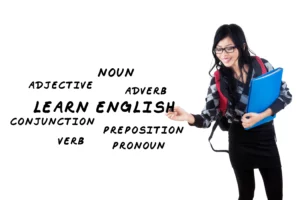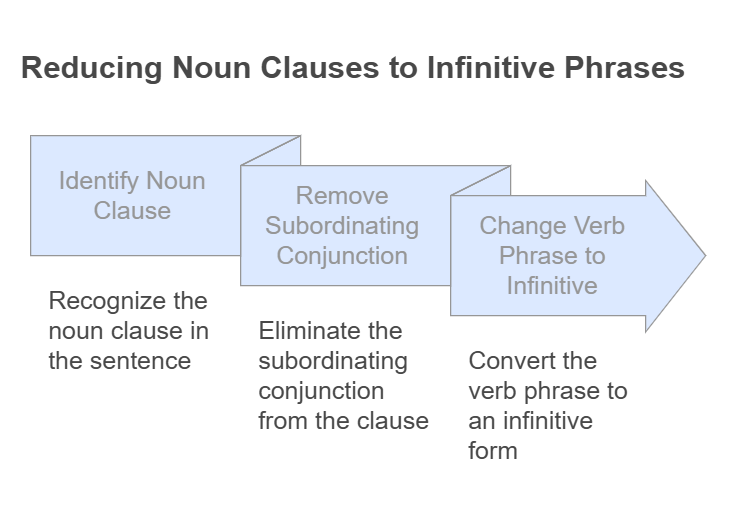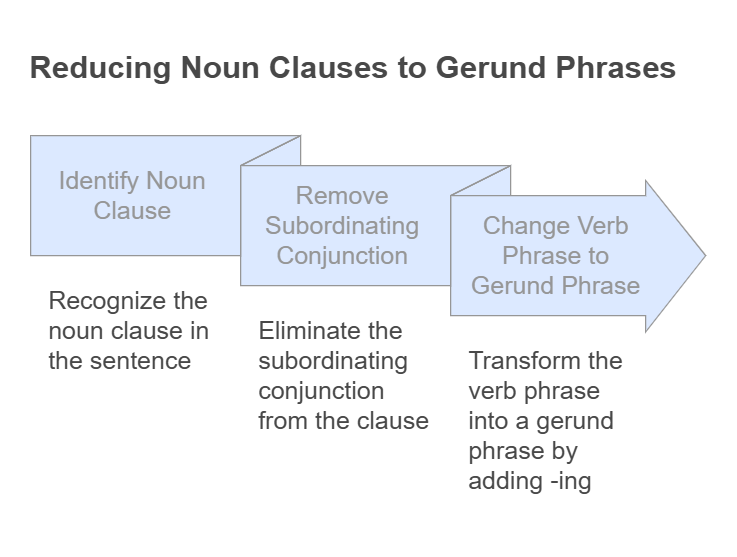Table of Contents
NOUNS! The fundamental concept that our teachers used to repeat class after class, year after year. Yet, nouns have their own variants and developments that we may be or may not be aware of. One such variety is the noun clause. This blog discusses what a noun clause is and how to reduce it.
Check out this video by Entri on Spoken English in Malayalam!
Introduction: What is a Noun Clause?
A noun clause is a type of dependent clause that performs the function of a noun, often acting as a subject, object, or complement in a sentence. In simpler words, noun clause is a group of words that are a part of a sentence. It acts like a noun and can be the subject, object, or the complement, just like how a regular noun would do. The Brief Oxford Dictionary of Linguistics defines a noun clause as “a clause whose syntactic role is considered as a noun or noun phrase“.
Here are some definitions to jog your memory:
Noun: A person, place, thing, or even an idea. It can be considered as the name of something.
Subject: The person, thing, or idea that does or is doing the action in a sentence. The part of the sentence that tells you what or who is the sentence about.
Object: The thing that receives the action in a sentence. It is who or what the action is being done to.
Complement: A word or a group of words that completes the meaning of a sentence. Gives more information about the subject or the object.
Struggling with English fluency? Enroll here to Join our Spoken English program!
Functions of a Noun Clause
Like nouns, noun clauses perform various functions within a sentence. They can:
- Act as the object of a verb, representing or receiving an action.
- Replace a noun within a sentence by receiving the event.
- Serve as a complement by identifying or describing the subject.
- Function as the object of a preposition.
Why Do We Reduce Noun Clauses?
Reducing noun clauses helps to create more concise sentences by eliminating unnecessary words and making writing more fluid. When two independent clauses share a common object, reducing one clause enhances clarity. For example:
- Full Clause: “They didn’t decide when they should leave.”
- Reduced: “They didn’t decide when to leave.”
Reduction simplifies writing, removing unnecessary words (e.g., who, which, that), and improves readability.
When Can a Noun Clause Be Reduced?
A noun clause can be reduced when:
- It functions as the object of a verb (direct object) or a complement.
- The subject of the main clause and the noun clause are the same.
Methods of Reducing Noun Clauses
1: Which of the sentences below is grammatically correct?
1. Using an Infinitive Phrase
To reduce a noun clause to an infinitive phrase:
- Remove the subordinating conjunction (that, if, whether, how, when, where, why).
- Change the verb phrase to an infinitive phrase (to + verb).
Examples:
- Full Clause: “He told me that I should wait outside.”
- Reduced: “He told me to wait outside.”
- Full Clause: “He promised that he would help me.”
- Reduced: “He promised to help me.”
2. Using a Gerund Phrase
To reduce a noun clause to a gerund phrase:
- Remove the subordinating conjunction.
- Change the verb phrase to a gerund phrase (verb + -ing).
Examples:
-
Full Clause: “They suggested that we take a break.”
-
Reduced: “They suggested taking a break.”
- Full Clause: “She denied that she had cheated in the exam.”
- Reduced: “She denied cheating in the exam.”
|
Download free PDFs on various aspects of the English language! |
|
|
|
|
Spoken English Course for Guaranteed Confidence and Career Growth
Spoken English Course by Entri App: Enhance your communication skills, gain certification, and boost your career with confidence.
Join Now!Noun Clauses Reduced Based on Their Starting Words
1. Reduction of Noun Clauses with Question Words!
Noun clauses that start with what, when, how, where, who, why, etc., can often be reduced to an infinitive phrase. These clauses are usually governed by verbs such as advise, agree, claim, decide, demand, hope, pretend, promise, ask, and say.
Examples:
- Full Clause: “They didn’t decide when they should leave.”
- Reduced: “They didn’t decide when to leave.”
- Full Clause: “He explained how he could solve the problem.”
- Reduced: “He explained how to solve the problem.”
2. Reduction of Noun Clauses with ‘That’
2.1 Reduction to an Infinitive Phrase
Noun clauses introduced by the word “that” can be reduced to an infinitive phrase. The reduction involves removing the subject, auxiliary verb, and the word that, while converting the main verb to its infinitive form.
Examples:
-
Full Clause: “Rahul promised that he would help me.”
-
Reduced: “Rahul promised to help me.”
2.2 Reduction to a Gerund Phrase
Certain verbs (acknowledge, admit, deny, insist, mention, propose, suggest) allow reduction to a gerund phrase.
Examples:
-
Full Clause: “He admitted that he had made a mistake.”
-
Reduced: “He admitted making a mistake.”
-
Full Clause: “She denied that she took the money.”
-
Reduced: “She denied taking the money.”
Limitations of Noun Clause Reduction
Not all noun clauses can be reduced. If reducing a noun clause results in an unnatural or unclear sentence, it is best to retain the full clause. For example:
- Full Clause: “I don’t understand why we must wait.”
- Reduced: “I don’t understand why to wait.” (Less common; some sentences sound awkward when reduced.)
If the reduction alters the meaning or sounds unnatural, it is best to avoid it. We have curated instances when it is best to avoid reducing noun clauses:
- When more detail is needed: If there are noun clauses that provide necessary details or explanations that actually adds meaning to the sentence, it’s best to leave it as it is. Reduction can lead to unintelligible sentences. Check out this example:
- Original: “The question is whether we should go to the dance.”
- Reduced: “The question is our question.” (The sentence doesn’t make any sense)
This is also applicable when the noun clause is necessary for clarity, or used for emphasis on certain ideas or opinions. Be careful while reducing and remember to weigh and analyse your options before making decisions. We don’t want your words to be meaningless!
Alternative Approaches for Difficult Reductions
When a noun clause is difficult to reduce, alternative methods can be used, for example:
- Original: “What you did was beyond our expectations.”
- Reduced: “Your action was beyond our expectations.”
Noun Clauses: To reduce or to keep it?
Reducing noun clauses improves sentence clarity and conciseness, making writing more fluid and engaging. By converting noun clauses into phrases (gerunds or infinitives), eliminating unnecessary words, or restructuring sentences, you enhance both written and spoken communication, leading to more effective expression in English. The essential and sensible thing to do is to approach in a careful and detailed manner.
If you feel like you need a certain platform to better understand noun clauses and the English grammar itself, enrol at our Spoken English course for sessions with experts and top-notch materials. On that note, we suggest you to practice and experimenting with the reduction of noun clauses and see for yourself if it makes sense or not (literally!). This way noun clauses and their reducing will be essentially a part of your writing!
Master pronunciation and fluency with our Spoken English classes! Enroll Here!
Related Articles
Spoken English Course for Guaranteed Confidence and Career Growth
Spoken English Course by Entri App: Enhance your communication skills, gain certification, and boost your career with confidence.
Join Now!Frequently Asked Questions
What is a noun clause?
A noun clause is a dependent clause that functions as a noun in a sentence. It can act as a subject, object, or complement.
Why should noun clauses be reduced?
Reducing noun clauses makes sentences more concise, improves readability, and enhances clarity in writing. It also helps avoid repetitive words like “that,” “who,” and “which.”
When can a noun clause be reduced?
A noun clause can be reduced when:
- It acts as the object of a verb or complement.
- The subject of the main clause and the noun clause are the same.













